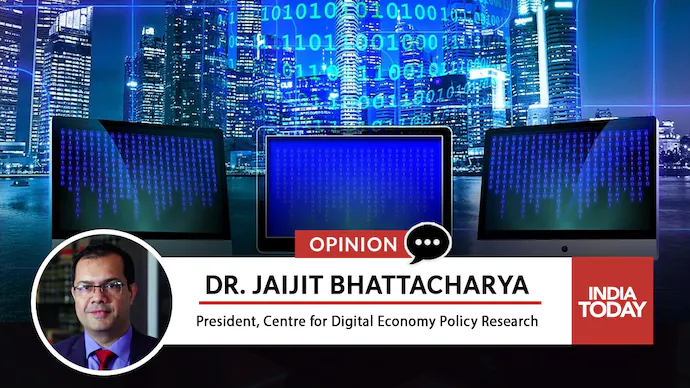
By Dr. Jaijit Bhattacharya
India will soon have its own Internet Governance Forum, in a week from now. It is a moment of both celebration and of introspection. It is also a moment to recognise the achievements of India as a nation, in adopting the Internet despite the myriad challenges. It is also a moment to recognise the many more miles to travel to ensure that the benefits of the Internet reach the last man standing. It has been a glorious journey for India in its adoption of the Internet and in becoming one of the largest Internet user bases in the world. In fact, for many applications and internet offerings, India is the largest user base.
Even where the Internet has not reached some Indian citizens, they are still benefiting from the network. Every single person, who is using the Jan Dhan bank accounts or getting Direct Benefit Transfer (DBT), is getting so because of the Internet. So, in a way, the Internet has touched almost every citizen of this great nation.
So, with such a strong achievement in Internet adoption, what does India expect to get out of the upcoming India Internet Governance Forum that is being held under the aegis of the UN Internet Governance Forum? With great technologies come great challenges. There are many issues that still need to be resolved. There are many new issues that have cropped up. And India still needs to ensure that the Internet stays a safe place for its citizens. A short article can never do justice to the diverse set of issues related to the Internet that still needs to be addressed. However, I will cover just a few to highlight the challenges ahead.
Let us take the simple issue of children accessing the Internet. It is very clear to all that children benefit immensely from access to the Internet, so much so that they could continue their education during the Wuhan Covid virus pandemic, only because of access to the Internet. So, what are the issues that children face on the Internet? There are, of course, the issues of inappropriate content, cyberbullying, cyber-harassment and malwares. But even more fundamentally, every access of an Internet-based service by a child is illegal as per the current laws. This is simply because the “click-wrap” agreements, i.e. what one signs off while accessing an internet service by ticking a checkbox and clicking on an “I Agree” button, is ab initio null and void for a child below 18 years of age, as per Indian laws. A child is not competent to enter into any agreement. Then how can any of the services used for education, such as Airmeet, Zoom, Microsoft Teams etc., be provided to children as their click-wrap agreement is not enforceable in any Indian court. How do we solve this issue? How do other countries solve this issue?
Let us take the issue of simple access to the Internet. Again, if we look at the lockdown due to the Wuhan Covid pandemic, access to healthcare was dependent on access to the Internet. As per recent studies by LirneAsia, 34% of the population got access to healthcare during the Wuhan Covid pandemic, because of access to the Internet. Therefore, as a corollary, many who did not have access to the Internet, also did not get access to healthcare. And if one does not get access to healthcare, it is impacting their fundamental right to life. Thus, the Internet or the lack of it, has now the consequence of impacting the fundamental rights of our citizens. And this is not any internet but broadband internet, as only broadband internet can support online healthcare delivery. Hence it becomes pertinent to discuss how one can rapidly provide broadband internet to all in a country that has a very diverse geography and different paying capacities.
India has been kind of late to the Internet and mobile applications party. Unfortunately, the digital economy has a way of rewarding those who came first through a phenomenon known as the Network Effect. The Network Effect essentially means that it is more beneficial for a new user to join a platform that has more users than joining a platform that has less users. Therefore, a newer digital platform will find it extremely challenging to compete with an existing one. This implies that Indian app players and digital platforms, such as Koo, will find it challenging to compete with the incumbents without appropriate policy support. So, what should the government do to provide a level playing field to such domestic players?
And then there is the issue of GovTech. How can governments adopt GovTech platforms, especially those built by domestic startups, to improve governance, provide better citizen services, provide better services to businesses, increase taxes, enhance security and provide citizen benefits more efficiently? How can startups and private players be able to use government IT systems to build more efficient systems? As a research paper from C-DEP.org has demonstrated, the economy stands to add at least 5% more if government systems are opened up through API’s (application programming interfaces) to startups to create more innovative solutions. How do we effect such changes?
There are many such opportunities and challenges that need to be debated and addressed through a mechanism that is termed as multistakeholderism. Essentially, it is a mechanism of discussing issues with various stakeholders in the society, such that the voice of all is heard. It is towards this end that we see the India Internet Governance Forum or IndiaIGF.in being held in the last week of this month. It will be a platform where a multitude of stakeholders will discuss and debate how we will continue to use the Internet. It will indeed be a time for celebrations of India’s achievements and to prepare India for the challenges ahead.
This article first appeared in India Today, https://www.indiatoday.in/opinion-columns/story/india-internet-governance-forum-the-what-and-why-1877317-2021-11-16